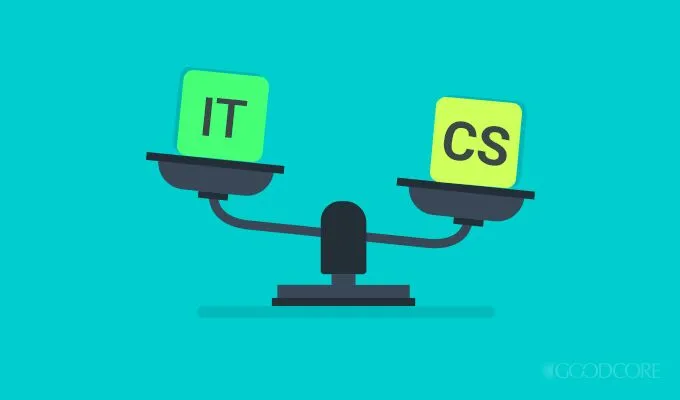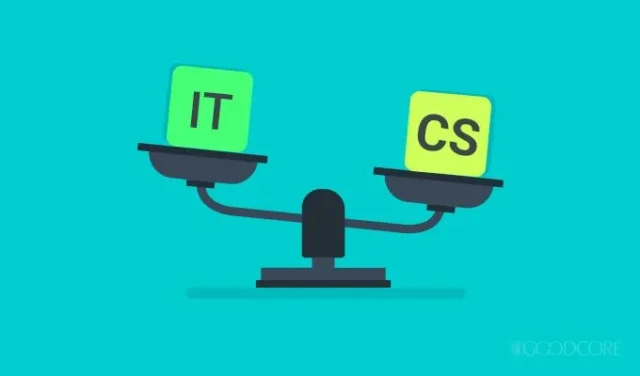In today’s ever-shifting digital landscape, many aspiring tech professionals in Nigeria—and across the globe—face an important crossroads: should one pursue Computer Science (CS) or Information Technology (IT)? Each path offers compelling opportunities, but they carve out quite different career trajectories. With the tech world in 2025 shaped by advances in AI, cloud, cybersecurity and more, making the right choice matters more than ever.
Table of Contents

Breaking Down the Disciplines: What Makes Computer Science and IT Different?
Let me explain in simple, human terms—Computer Science is like the engine room of a ship. It involves building the software, understanding algorithms, writing code, and tackling theoretical computing problems. On the other hand, Information Technology is more like the bridge and the control systems—ensuring networks run smoothly, supporting users, managing infrastructure and applying those computing solutions in real-world contexts. One source puts it plainly: “CS focuses on theoretical aspects of computing, algorithms and software development, while IT is geared more toward applying these technologies in business and practical environments.”
In essence:
- CS graduates often go into roles like software engineering, AI, machine learning, data science or systems architecture.
- IT graduates gravitate toward network administration, cybersecurity, user support, and infrastructure management.
This fundamental distinction already begins to hint at how each specialisation may shape your tech career differently in 2025—depending on your interests and aspirations.
Looking Ahead: Career Demand in 2025 and Beyond
Now, let’s look at what the job market is demanding right now, particularly for 2025 and beyond.
For Computer Science:
The AI boom and data-driven economy are doing wonders for CS grads. Roles such as AI/ML engineer, data scientist and software developer remain in high demand. A recent report shows data science employment could increase by nearly 42%, while computer systems design is projected to grow around 20% through 2033. Meanwhile, edge computing, IoT, and cloud solutions are creating fresh avenues for CS professionals in distributed systems development.
In Nigeria, the national 3-Million Technical Talent (3MTT) initiative is boosting digital skills across disciplines like AI, cybersecurity, cloud computing, and software engineering. It seeks to produce a strong base of tech-ready graduates—and that includes both CS and IT talents.

For Information Technology:
IT is enjoying no less enthusiasm. Cloud, cybersecurity, AI uptake, and data analytics are fuelling demand for IT specialists. Global IT spending is forecast to reach USD 5.75 trillion by 2025—a signal that organisations will continue to need IT professionals on the ground. Bureau of Labour Statistics data also projects healthy growth rates for several IT occupations: information security analysts (+33%), software developers and QA Analysts (+17–20%), IT managers and support roles–all with upward trajectories through 2029.
In Nigeria too, IT skills are in demand. Cybersecurity, cloud administration, prompt engineering as a function of AI integration, and DevOps roles are increasingly necessary in enterprises and institutions.
Is One Gaining Ground Over the Other?
While both fields are robust, Computer Science arguably has a slight edge in the age of AI and data revolution—as it builds the engines powering these transformations. But IT remains crucial to keep the systems, networks, and security infrastructure stable and scalable. In short, both specialisations are shaping strong tech careers—just in slightly different terrain.
The Human Factor: Skills, Adaptability and the Nigerian Context
Beyond pure job growth numbers, a person’s success in tech hinges on human qualities and how well they match the evolving market.
Certifications and Skill Gap
Studies show that pairing a Computer Science degree with targeted industry certifications (like AI-900 for AI fundamentals) boosts employability for ML Engineer roles dramatically. In Nigeria’s context—with 3MTT, NACOS (Nigeria Association of Computing Students) and digital training hubs—earning certificates and soft skills can bridge gaps and strengthen one’s portfolio.
Soft Skills and Practical Experience
Research shows that both computer science and IT roles demand more than just technical know-how. Communication, teamwork, adaptability, and practical problem-solving skills rank high. Skills like Git, SQL, business acumen, alongside soft competencies are increasingly valued by employers.arXiv
Recent reports on the tech job market (globally) warn that entry-level roles are being squeezed—AI is even automating some coding tasks, causing competition. However, CS graduates with knowledge of AI, ethics, AI regulation, or prompt engineering still stand out.
In Nigeria, where hands-on experience is prized, IT grads who can manage networks, infrastructure, or serve in hybrid/junior roles effectively—especially supported by internship or certification—can find viable opportunities, even if AI continues shifting coding workflows.
Personalised Choice: What Fits You Best?
Let’s be honest: your passion and aptitude matter most. If you’re excited by building systems, solving complex logic problems, or developing AI tools—Computer Science might be your calling. If you’re curious about integrating technologies, making them work smoothly in organisations, managing operations—that’s where IT shines.
Both paths offer strategic flexibility—many IT professionals pivot into software or DevOps with extra training; likewise, CS grads can slide into cybersecurity, cloud administration or IT management with some upskilling.

Pick Your Path, Future-Proof Your Journey
To wrap up in a tone that speaks to you personally:
- Both Computer Science and Information Technology remain solid, growing routes to tech careers in 2025.
- CS gives strong access to emerging domains like AI, data science, automation, and software architecture.
- IT offers vital roles in applying these technologies—networks, cybersecurity, cloud, support, and operations.
- Your success will also hinge on certifications, soft skills, adaptability, and real-world experience.
- In Nigeria, support infrastructures like 3MTT and NACOS provide platforms for both disciplines to thrive.
So, whichever path aligns with your passion and strengths, go for it—with focus, flexibility and a hunger to learn. That’s how you’ll thrive in tech in 2025 and beyond.
Join Our Social Media Channels:
WhatsApp: NaijaEyes
Facebook: NaijaEyes
Twitter: NaijaEyes
Instagram: NaijaEyes
TikTok: NaijaEyes





